Iris Ruth Pastor's Blog, page 22
December 3, 2021
The Lens Through Which We Perceive
The lens through which we perceive
colors everything.
When I’m happy,
I take things in stride
and put things in “proper” perspective.
“Proper” meaning realistic –
not distorted
not over-blown
not leaning toward the negative.
But….
Oh my….
When I go to my dark place,
When I look for things
to make me sad
and mad
and despairing,
it’s so easy
to go down the unlighted rabbit hole
and clutch the demons to me.
This year,
I was haunted by the ghosts
of Thanksgivings past.
This year,
I failed to revel in the moment.
This year,
I obsessed over what was,
not the joys of what are.
Dwelling on the fact
that I’ve got
more yesterdays than tomorrows –
Missing my husband over the weekend –
who was recovering from pneumonia
1000 miles away –
only intensified my funk.
I know I’m not alone.
Visiting the local liquor store
the night before Thanksgiving,
the aisles are teeming with shoppers.
The lines are long.
The carts are overflowing.
All are intent on finding the right brew
to induce the right mood:
Tito’s Handmade Vodka
Malibu Coconut Rum
Clearly, I’m not the only one
yearning to be free of loss and regret,
itching to cut loose,
itching to have
a rip-roaring grand time
with our nearest and dearest,
as we break bread –
but not our bond –
during the holiday weekend
of Thanksgiving.
I aspired to rise to the occasion.
To be:
more accepting of the ravages of time,
more adaptable to what is, not was,
less reflective and more participatory.
Most years I manage
to carry it off.
This year, I didn’t.
But next year….
Well, next year….
might very well be different.
Keep Preserving Your Bloom,
Iris Ruth Pastor
colors everything.
When I’m happy,
I take things in stride
and put things in “proper” perspective.
“Proper” meaning realistic –
not distorted
not over-blown
not leaning toward the negative.
But….
Oh my….
When I go to my dark place,
When I look for things
to make me sad
and mad
and despairing,
it’s so easy
to go down the unlighted rabbit hole
and clutch the demons to me.
This year,
I was haunted by the ghosts
of Thanksgivings past.
This year,
I failed to revel in the moment.
This year,
I obsessed over what was,
not the joys of what are.
Dwelling on the fact
that I’ve got
more yesterdays than tomorrows –
Missing my husband over the weekend –
who was recovering from pneumonia
1000 miles away –
only intensified my funk.
I know I’m not alone.
Visiting the local liquor store
the night before Thanksgiving,
the aisles are teeming with shoppers.
The lines are long.
The carts are overflowing.
All are intent on finding the right brew
to induce the right mood:
Tito’s Handmade Vodka
Malibu Coconut Rum
Clearly, I’m not the only one
yearning to be free of loss and regret,
itching to cut loose,
itching to have
a rip-roaring grand time
with our nearest and dearest,
as we break bread –
but not our bond –
during the holiday weekend
of Thanksgiving.
I aspired to rise to the occasion.
To be:
more accepting of the ravages of time,
more adaptable to what is, not was,
less reflective and more participatory.
Most years I manage
to carry it off.
This year, I didn’t.
But next year….
Well, next year….
might very well be different.
Keep Preserving Your Bloom,
Iris Ruth Pastor
PS: As memories of the holiday weekend faded, my spirits began to rise. You might say, “My mojo returned.”
Once more, I’m smiling. I’m energized. I’m excited. And why not? Tonight starts the beginning of another family-filled weekend: my grandson’s Bar Mitzvah.
For me, the reality is there ARE less tomorrows than yesterdays. That’s why I’m no longer squandering a single day.
Published on December 03, 2021 12:00
November 26, 2021
No Substitute for Hard Work and Gratitude
There is no substitute for hard work, as these quotes reflect:
“It doesn’t matter how great your shoes are if you don’t accomplish anything in them.”
― Martina Boone, Compulsion
“Logic will get you from point A to point B. Imagination and hard work will take you everywhere else.”
― Albert Einstein
“Maybe the cure for any burnout is to work harder.”
― Phil Knight, Shoe Dog: A Memoir by the Creator of NIKE
“Work smartly, diligently and silently; One day your introduction will be “Google Me.”
― Kayambila Mpulamasaka
“If you trust in yourself. . .and believe in your dreams. . .and follow your star. . . you’ll still get beaten by people who spent their time working hard and learning things and weren’t so lazy.”
― Terry Pratchett, The Wee Free Men
“The difference between ordinary and extraordinary is that little extra.”
― Jimmy Johnson
And what happens after we do the heavy lifting? After we achieve the level of success we were striving to reach? What then? How important a component is gratitude among the super successful?
I recently came across an intriguing article by Ruth Umoh on how some of the most successful business minds live a gratitude-filled life. (Ruth Umoh is editor-in-chief of The Filament and a veteran business journalist.) Umoh states that taking the time to be thankful and appreciative for things you have received – tangible or intangible – makes you feel more positive emotions, relish good experiences, improve your health, help you deal with adversity and build strong relationships — all crucial both in and out of the workplace.
Umoh states that taking the time to be thankful and appreciative for things you have received – tangible or intangible – makes you feel more positive emotions, relish good experiences, improve your health, help you deal with adversity and build strong relationships — all crucial both in and out of the workplace. Umoh mentions Oprah Winfrey, who tracked the things she was grateful for in a “gratitude journal” for a decade. Here’s what Oprah was grateful for on October 12, 1996:
Umoh mentions Oprah Winfrey, who tracked the things she was grateful for in a “gratitude journal” for a decade. Here’s what Oprah was grateful for on October 12, 1996:
1. A run around Florida’s Fisher Island with a slight breeze that kept me cool.
2. Eating cold melon on a bench in the sun.
3 . A long and hilarious chat with Gayle about her blind date with Mr. Potato Head.
4. Sorbet in a cone, so sweet that I literally licked my finger.
5. Maya Angelou calling to read me a new poem. In 2014, Mark Zuckerberg challenged himself to write one thank you note a day to counter his critical nature, social awkwardness and to express more gratitude. “It’s important for me, because I’m a really critical person,” Zuckerberg told Bloomberg Business Week. “I always kind of see how I want things to be better, and I’m generally not happy with how things are, or the level of service that we’re providing for people, or the quality of the teams that we built.”
In 2014, Mark Zuckerberg challenged himself to write one thank you note a day to counter his critical nature, social awkwardness and to express more gratitude. “It’s important for me, because I’m a really critical person,” Zuckerberg told Bloomberg Business Week. “I always kind of see how I want things to be better, and I’m generally not happy with how things are, or the level of service that we’re providing for people, or the quality of the teams that we built.”  Former PepsiCo CEO Indra Nooyi revealed in an interview with Fortune that she sends letters to the parents of top Pepsi executives. She began doing so after a trip home to India, where she witnessed her mother’s pride at all the praise she received about her daughter’s success.There is no substitute for hard work, just as there is no substitute for being thankful for what we have and having others give credence to our contributions too. And on this day – the day after Thanksgiving – many of us are fortunate to wake up in comfortable surroundings, with full bellies and full hearts filled with gratitude as well. And that consciousness of gratitude – for what we already have and what we already have achieved – can go a long way in upping our chances for both happiness and success – in and out of the work force – in the coming days and months.
Former PepsiCo CEO Indra Nooyi revealed in an interview with Fortune that she sends letters to the parents of top Pepsi executives. She began doing so after a trip home to India, where she witnessed her mother’s pride at all the praise she received about her daughter’s success.There is no substitute for hard work, just as there is no substitute for being thankful for what we have and having others give credence to our contributions too. And on this day – the day after Thanksgiving – many of us are fortunate to wake up in comfortable surroundings, with full bellies and full hearts filled with gratitude as well. And that consciousness of gratitude – for what we already have and what we already have achieved – can go a long way in upping our chances for both happiness and success – in and out of the work force – in the coming days and months.
Especially if we spread the message of conscious gratitude around – genuinely, thoughtfully and frequently.
Keep Preserving Your Bloom,
Iris Ruth Pastor
PS: Thank you to my social media gal, Irna Skoljik, for finding the quotes on hard work.
“It doesn’t matter how great your shoes are if you don’t accomplish anything in them.”
― Martina Boone, Compulsion
“Logic will get you from point A to point B. Imagination and hard work will take you everywhere else.”
― Albert Einstein
“Maybe the cure for any burnout is to work harder.”
― Phil Knight, Shoe Dog: A Memoir by the Creator of NIKE
“Work smartly, diligently and silently; One day your introduction will be “Google Me.”
― Kayambila Mpulamasaka
“If you trust in yourself. . .and believe in your dreams. . .and follow your star. . . you’ll still get beaten by people who spent their time working hard and learning things and weren’t so lazy.”
― Terry Pratchett, The Wee Free Men
“The difference between ordinary and extraordinary is that little extra.”
― Jimmy Johnson
And what happens after we do the heavy lifting? After we achieve the level of success we were striving to reach? What then? How important a component is gratitude among the super successful?
I recently came across an intriguing article by Ruth Umoh on how some of the most successful business minds live a gratitude-filled life. (Ruth Umoh is editor-in-chief of The Filament and a veteran business journalist.)
 Umoh states that taking the time to be thankful and appreciative for things you have received – tangible or intangible – makes you feel more positive emotions, relish good experiences, improve your health, help you deal with adversity and build strong relationships — all crucial both in and out of the workplace.
Umoh states that taking the time to be thankful and appreciative for things you have received – tangible or intangible – makes you feel more positive emotions, relish good experiences, improve your health, help you deal with adversity and build strong relationships — all crucial both in and out of the workplace. Umoh mentions Oprah Winfrey, who tracked the things she was grateful for in a “gratitude journal” for a decade. Here’s what Oprah was grateful for on October 12, 1996:
Umoh mentions Oprah Winfrey, who tracked the things she was grateful for in a “gratitude journal” for a decade. Here’s what Oprah was grateful for on October 12, 1996: 1. A run around Florida’s Fisher Island with a slight breeze that kept me cool.
2. Eating cold melon on a bench in the sun.
3 . A long and hilarious chat with Gayle about her blind date with Mr. Potato Head.
4. Sorbet in a cone, so sweet that I literally licked my finger.
5. Maya Angelou calling to read me a new poem.
 In 2014, Mark Zuckerberg challenged himself to write one thank you note a day to counter his critical nature, social awkwardness and to express more gratitude. “It’s important for me, because I’m a really critical person,” Zuckerberg told Bloomberg Business Week. “I always kind of see how I want things to be better, and I’m generally not happy with how things are, or the level of service that we’re providing for people, or the quality of the teams that we built.”
In 2014, Mark Zuckerberg challenged himself to write one thank you note a day to counter his critical nature, social awkwardness and to express more gratitude. “It’s important for me, because I’m a really critical person,” Zuckerberg told Bloomberg Business Week. “I always kind of see how I want things to be better, and I’m generally not happy with how things are, or the level of service that we’re providing for people, or the quality of the teams that we built.”  Former PepsiCo CEO Indra Nooyi revealed in an interview with Fortune that she sends letters to the parents of top Pepsi executives. She began doing so after a trip home to India, where she witnessed her mother’s pride at all the praise she received about her daughter’s success.There is no substitute for hard work, just as there is no substitute for being thankful for what we have and having others give credence to our contributions too. And on this day – the day after Thanksgiving – many of us are fortunate to wake up in comfortable surroundings, with full bellies and full hearts filled with gratitude as well. And that consciousness of gratitude – for what we already have and what we already have achieved – can go a long way in upping our chances for both happiness and success – in and out of the work force – in the coming days and months.
Former PepsiCo CEO Indra Nooyi revealed in an interview with Fortune that she sends letters to the parents of top Pepsi executives. She began doing so after a trip home to India, where she witnessed her mother’s pride at all the praise she received about her daughter’s success.There is no substitute for hard work, just as there is no substitute for being thankful for what we have and having others give credence to our contributions too. And on this day – the day after Thanksgiving – many of us are fortunate to wake up in comfortable surroundings, with full bellies and full hearts filled with gratitude as well. And that consciousness of gratitude – for what we already have and what we already have achieved – can go a long way in upping our chances for both happiness and success – in and out of the work force – in the coming days and months.Especially if we spread the message of conscious gratitude around – genuinely, thoughtfully and frequently.
Keep Preserving Your Bloom,
Iris Ruth Pastor
PS: Thank you to my social media gal, Irna Skoljik, for finding the quotes on hard work.
Published on November 26, 2021 07:00
November 19, 2021
The December Dilemma
I’m traveling with a friend. We stop at an artist’s cooperative in a university town on our way back home. We spot a dizzying array of Christmas tree ornaments. As always, we ignore them – they have no relevance in our Jewish lives.
Abruptly, my friend stops in her tracks. “Actually,” she notes, “a Christmas tree does have some relevance in my life because one of my kids puts one up yearly. Do you think I should buy her and her family an ornament as an inclusive gesture of good holiday cheer?”
Confusion reigns down upon me. I have no idea how to answer her. What if she bought that adorable bagel Christmas tree ornament and sent it to her daughter to hang up as her kids decorated the tree? Would it be welcomed? Would it be in bad taste? Would it confuse her grandchildren? Would it chip away at her daughter’s commitment to raise her kids Jewish even though she is in an inter-faith marriage and has made a concession to her husband to yearly put up a tree?
My friend passes on the purchase, but the questions linger as we head home.
Ah! The December Dilemma – that treacherous time of year when multiple holidays collide and even people with good intentions can become embroiled in toxic misunderstandings.

And it’s no wonder so many of us wonder. From the Pew Research site, I gather the following information:
About four-in-ten married Jews (42%) have a non-Jewish spouse… intermarriage is almost nonexistent among married Orthodox Jews (2%), while nearly half of all non-Orthodox Jews who are married say their spouse is not Jewish (47%). Intermarriage is more common among those who have married in recent years: Among Jewish respondents who got married since the beginning of 2010, 61% have a non-Jewish spouse, compared with 18% of Jews who got married before 1980.
My friend and I jokingly rattle off a random list of 15 Jewish friends who have married children. Eleven of them have kids who have married non-Jews.
Days pass and a barrage of thoughts continually assault me on how to both approach and celebrate the holidays in mixed marriage households with children.
I approach one of my favorite rabbis for counsel and guidance.
Rabbi Gary Klein is Rabbi Emeritus at Temple Ahavat Shalom in Palm Harbor, Florida. Below are his thoughts:
It is important that Jews in interfaith families do not become confused and come to believe that both holidays can be theirs. A Jewish child growing up in an interfaith home can enjoy celebrating Christmas with his or her Christian parent, aunts and uncles and grandparents; but should not be taught that Christmas is his or her holiday. The same should hold true for a child being raised as a Christian in an interfaith family. They can enjoy the holiday of their Jewish family members; but not be expected and should not be taught to view it as their holiday; as there are huge differences in the fundamental teachings of Judaism and Christianity.
Children, at least as early as the time they reach middle school, can see that some of the major teachings of one religion contradict some of the major teachings of the other. It’s important for a child’s self-esteem that they feel that a certain synagogue or a certain church is their second home, that they belong there. But children will soon come to see, especially if they are raised believing that they are both Jewish and Christian, that they are neither, and won’t feel at home anywhere. They can, however, be Jews who love Christians and respect Christianity; or Christians who love Jews and respect Judaism.
Eight more days until we light the first candles on the Menorah, with Christmas closely following. Here’s to peace, tranquility and mutual respect during this holiday season.
Keep Preserving Your Bloom,
Iris Ruth Pastor
Abruptly, my friend stops in her tracks. “Actually,” she notes, “a Christmas tree does have some relevance in my life because one of my kids puts one up yearly. Do you think I should buy her and her family an ornament as an inclusive gesture of good holiday cheer?”
Confusion reigns down upon me. I have no idea how to answer her. What if she bought that adorable bagel Christmas tree ornament and sent it to her daughter to hang up as her kids decorated the tree? Would it be welcomed? Would it be in bad taste? Would it confuse her grandchildren? Would it chip away at her daughter’s commitment to raise her kids Jewish even though she is in an inter-faith marriage and has made a concession to her husband to yearly put up a tree?
My friend passes on the purchase, but the questions linger as we head home.
Ah! The December Dilemma – that treacherous time of year when multiple holidays collide and even people with good intentions can become embroiled in toxic misunderstandings.

And it’s no wonder so many of us wonder. From the Pew Research site, I gather the following information:
About four-in-ten married Jews (42%) have a non-Jewish spouse… intermarriage is almost nonexistent among married Orthodox Jews (2%), while nearly half of all non-Orthodox Jews who are married say their spouse is not Jewish (47%). Intermarriage is more common among those who have married in recent years: Among Jewish respondents who got married since the beginning of 2010, 61% have a non-Jewish spouse, compared with 18% of Jews who got married before 1980.
My friend and I jokingly rattle off a random list of 15 Jewish friends who have married children. Eleven of them have kids who have married non-Jews.
Days pass and a barrage of thoughts continually assault me on how to both approach and celebrate the holidays in mixed marriage households with children.
I approach one of my favorite rabbis for counsel and guidance.
Rabbi Gary Klein is Rabbi Emeritus at Temple Ahavat Shalom in Palm Harbor, Florida. Below are his thoughts:
It is important that Jews in interfaith families do not become confused and come to believe that both holidays can be theirs. A Jewish child growing up in an interfaith home can enjoy celebrating Christmas with his or her Christian parent, aunts and uncles and grandparents; but should not be taught that Christmas is his or her holiday. The same should hold true for a child being raised as a Christian in an interfaith family. They can enjoy the holiday of their Jewish family members; but not be expected and should not be taught to view it as their holiday; as there are huge differences in the fundamental teachings of Judaism and Christianity.
Children, at least as early as the time they reach middle school, can see that some of the major teachings of one religion contradict some of the major teachings of the other. It’s important for a child’s self-esteem that they feel that a certain synagogue or a certain church is their second home, that they belong there. But children will soon come to see, especially if they are raised believing that they are both Jewish and Christian, that they are neither, and won’t feel at home anywhere. They can, however, be Jews who love Christians and respect Christianity; or Christians who love Jews and respect Judaism.
Eight more days until we light the first candles on the Menorah, with Christmas closely following. Here’s to peace, tranquility and mutual respect during this holiday season.
Keep Preserving Your Bloom,
Iris Ruth Pastor
Published on November 19, 2021 12:10
November 12, 2021
Not a travel writer, nor particularly resourceful
Through a series of events I could not entirely control, my husband and I find ourselves vacationing on Amelia Island last weekend – near Jacksonville, Florida.
Confined in a neck brace, he is still in the throes of post-surgery recovery. Because the proprietress of the bed and breakfast where we had reservations was adamant about us not re-scheduling a second time, we drive to our beachy destination on Saturday, watching the outside temperature drop from 70 degrees, to 60, to 50 to 45 as we barrel further north. Amelia Island is shrouded in darkness and cold slivers of rain, coupled with shearing wind, pounding our windshield as we pull up to Williams House.

“What a delightful beginning to our two-day get away,” I glumly mutter out loud.
As we lug our suitcases up the brick path, a lovely woman greets us at the door, announcing Happy Hour in the formal living room in 15 minutes. My husband falls asleep as I hastily unpack. I slash on some bright red lipstick and black mascara and slip into a flowing flowered caftan. I descend the huge majestic mahogany staircase eager to socialize – knowing I look rather stunning and dramatic – if I don’t say so myself.
The fireplace is lit. The wine is laid out. Classical music plays softly in the back ground. I seem to be the first guest to arrive. I drink two generously sized glasses of wine, fall fast asleep on the settee. and awake an hour later.
The lovely woman is back.
“Oh no! Did I miss all the guests?” I ask petulantly.
“No, Ma’am,” she replies politely. “You and your husband are the only ones staying here this weekend.”
I don’t know whether to rejoice or cry.
I re-climb the stairs, wake my husband, we order a pizza, eat too much of it and then sleep soundly til morning. When the tantalizing aroma of maple syrup and strongly brewed coffee drifts up past the majestic stain glass windows lining the staircase and eases into our room, we rouse and gaze out the window.

And then we head downstairs. We feast on buttery croissants, fresh fruit, an eggy soufflé and linger over the coffee, while we learn about the urban legend in regard to the Williams House.
Built in 1856, the original owner sold the house to Marcellus Williams, a Northerner, who proceeded to free his slaves. Local lore boasts that this majestic Greek Revival mansion then became part of the Underground Railroad. The present owner, an architect from New York, refutes that claim.
“I have searched for secret doors to the crawl space. There are none. And I literally crawled on my belly beneath the house in search of a hidden space large enough to hide a runaway slave. Sadly, none exists.”
Though it remains unseasonably cold, the sun is peeking through the clouds. What should we do? Even in our best of times, we don’t golf. And we don’t play tennis. Biking and hiking together is out of the question due to my husband’s post-op limitations. Ditto for touring the Kingsley Plantation or walking on the hard-packed sand of The American Beach. And exploring the famous dunes named “Nana” in search of gopher turtles – not happening either.
My hubby heads back to our room to relax.
So I default to what I always do when visiting a new locale. I seek out:
Independent bookstores,
Art galleries featuring local artists
Boutiques
In other words, he naps and I shop.
And my best find – that takes the sting out of the limitations of our getaway weekend? A wooden, shabby chic, oversized plaque that fits perfectly on my front porch:

Keep Preserving Your Bloom,
Iris Ruth Pastor
P.S. This nifty little periodical features Bed and Breakfasts across the country that have passed comprehensive quality inspections in the industry. For additional info, go to
www.selectregistry.com
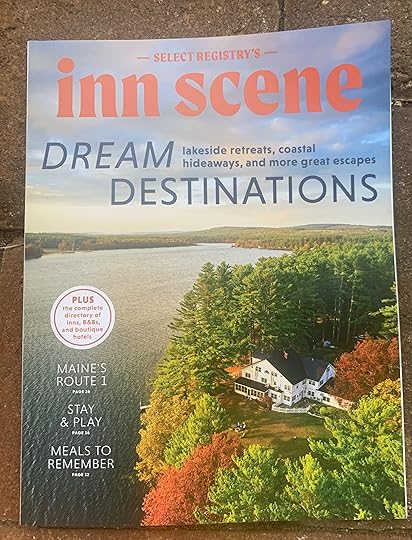
Confined in a neck brace, he is still in the throes of post-surgery recovery. Because the proprietress of the bed and breakfast where we had reservations was adamant about us not re-scheduling a second time, we drive to our beachy destination on Saturday, watching the outside temperature drop from 70 degrees, to 60, to 50 to 45 as we barrel further north. Amelia Island is shrouded in darkness and cold slivers of rain, coupled with shearing wind, pounding our windshield as we pull up to Williams House.

“What a delightful beginning to our two-day get away,” I glumly mutter out loud.
As we lug our suitcases up the brick path, a lovely woman greets us at the door, announcing Happy Hour in the formal living room in 15 minutes. My husband falls asleep as I hastily unpack. I slash on some bright red lipstick and black mascara and slip into a flowing flowered caftan. I descend the huge majestic mahogany staircase eager to socialize – knowing I look rather stunning and dramatic – if I don’t say so myself.
The fireplace is lit. The wine is laid out. Classical music plays softly in the back ground. I seem to be the first guest to arrive. I drink two generously sized glasses of wine, fall fast asleep on the settee. and awake an hour later.
The lovely woman is back.
“Oh no! Did I miss all the guests?” I ask petulantly.
“No, Ma’am,” she replies politely. “You and your husband are the only ones staying here this weekend.”
I don’t know whether to rejoice or cry.
I re-climb the stairs, wake my husband, we order a pizza, eat too much of it and then sleep soundly til morning. When the tantalizing aroma of maple syrup and strongly brewed coffee drifts up past the majestic stain glass windows lining the staircase and eases into our room, we rouse and gaze out the window.

And then we head downstairs. We feast on buttery croissants, fresh fruit, an eggy soufflé and linger over the coffee, while we learn about the urban legend in regard to the Williams House.
Built in 1856, the original owner sold the house to Marcellus Williams, a Northerner, who proceeded to free his slaves. Local lore boasts that this majestic Greek Revival mansion then became part of the Underground Railroad. The present owner, an architect from New York, refutes that claim.
“I have searched for secret doors to the crawl space. There are none. And I literally crawled on my belly beneath the house in search of a hidden space large enough to hide a runaway slave. Sadly, none exists.”
Though it remains unseasonably cold, the sun is peeking through the clouds. What should we do? Even in our best of times, we don’t golf. And we don’t play tennis. Biking and hiking together is out of the question due to my husband’s post-op limitations. Ditto for touring the Kingsley Plantation or walking on the hard-packed sand of The American Beach. And exploring the famous dunes named “Nana” in search of gopher turtles – not happening either.
My hubby heads back to our room to relax.
So I default to what I always do when visiting a new locale. I seek out:
Independent bookstores,
Art galleries featuring local artists
Boutiques
In other words, he naps and I shop.
And my best find – that takes the sting out of the limitations of our getaway weekend? A wooden, shabby chic, oversized plaque that fits perfectly on my front porch:

Keep Preserving Your Bloom,
Iris Ruth Pastor
P.S. This nifty little periodical features Bed and Breakfasts across the country that have passed comprehensive quality inspections in the industry. For additional info, go to
www.selectregistry.com

Published on November 12, 2021 07:00
November 5, 2021
I Wonder If This Is Normal
I wake up in the morning and gaze in the mirror. I can’t believe the 74-year-old face peering back at me.

Mirrors aren’t the only mile markers to remind me of my place in the universe.
Glass Canisters
When I first married – in my junior year of college – I bought a bunch of glass canisters to grace our Formica kitchen counter. I filled them with red licorice, black licorice, giant gum balls, marshmallows, M&M’s and malted milk balls.
Over the years, the canisters remained, but their contents changed. With the birth of my kids, I gradually replaced the candy with Fig Newtons, raisins, and peanut butter crackers.
Formica gradually gave way to granite. The kids flew the nest and the canisters contents evolved yet again: a vast assortment of nuts, chia seeds, Grape Nuts cereal, brown rice and mini Kind Bars.
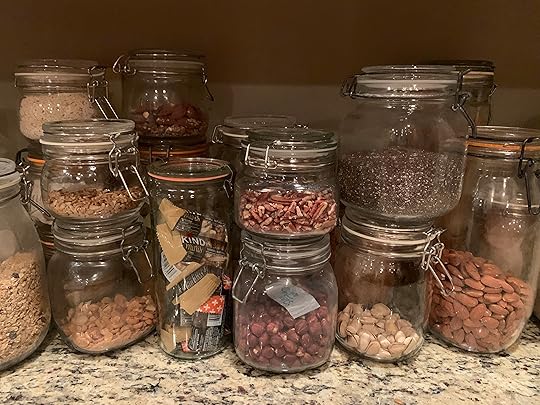
Shoes
My array of shoes is another reflection of time passing from one delineated stage to another.
Then: Booties to high top baby shoes to saddle shoes to penny loafers to training heels to high stilettos
Now: Flats, sandals, and lots of sneakers – with one common theme: LOW TO THE GROUND.
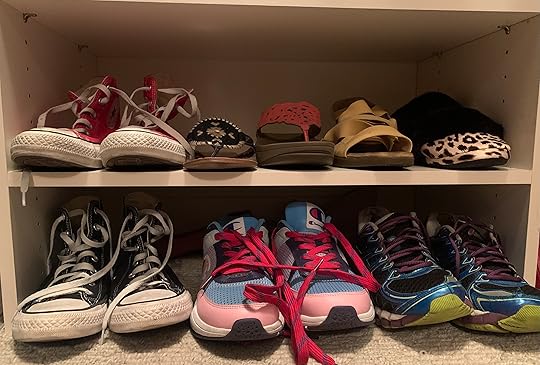
Parents
Another mile marker is how my attitude, priorities, wishes and dreams have changed after burying both my parents. My dad died right after my 65th birthday and my mother died after my 70th birthday. With their departure, I feel compelled to surround myself with people who knew me in my beginning years. It’s manifesting itself in a weird compulsion – reminding me of the nesting instinct that kicks in when pregnant. Nesting is an instinct or urge in pregnant animals (think cats, hamsters, and birds) and humans to prepare a home – to make it safe and comfortable and inviting. My nesting instinct has surreptitiously sneaked in – without the accompanying pregnancy – thank goodness. My nesting instinct is manifesting itself as a vision of a second home where my roots are: in my hometown. As the years roll by, I’m longing to unite and attach to anything and anyone with a connection to my parents.
Distant relatives
The few friends of theirs still left
Children of their cronies
The neighbors and friends I grew up with I want to frequent and enjoy the places they patronized:
The Great American Ball Park (My dad had season tickets to the Cincinnati Reds for years)
Union Terminal – my mother made a commercial at age 88 to vote for a levy to restore Cincinnati’s Art Deco train station and it passed resoundingly
The boutiques she patronised and the eateries she visited routinely, alone, as a widow
The jewelry store where she bought for each of her great granddaughters’ birthdays another pearl to string on a necklace she hoped to give them on the eve of their Bat Mitzvahs.
What is behind all this longing?
Is it a stage of mourning I’ve yet to embrace?
I know spotting a mother/daughter duo out together is no longer a gut punch, though it is still cringeworthy.
I recognize my siblings – both by birth and by marriage – have become more important than ever
I hold sacred the weekly zoom calls with far-flung family
And gathering together to celebrate, not just events, but our continued good health, with those we have known for decades has become highly prized.
It’s so funny, but once again, I feel like the pain of loss leads me back – eventually – to revel in the joys and the blessings in my life – many of which continue to emanate from my hometown.
Home Sweet Home….
The December Dilemma

The holidays are fast approaching. Getting through them with a modicum of grace and dignity – minus hurt feelings and ruffled feathers – is not easy. Adding inter-faith marriage to the mix only lights the flames of dissension faster.
I would like to devote a column to this timely subject. Please feel free to respond to the questions below. I whole heartedly welcome your feedback
Warm regards,
Iris
What are some potential pitfalls when celebrating with an interfaith family?
How do you preserve religious traditions without offending?
What experience have you had with sharing the non-religious parts of the holiday season together?
What holiday themed projects can you do together to bond?
If you experience something blatantly offensive, how do you deal with it?

Mirrors aren’t the only mile markers to remind me of my place in the universe.
Glass Canisters
When I first married – in my junior year of college – I bought a bunch of glass canisters to grace our Formica kitchen counter. I filled them with red licorice, black licorice, giant gum balls, marshmallows, M&M’s and malted milk balls.
Over the years, the canisters remained, but their contents changed. With the birth of my kids, I gradually replaced the candy with Fig Newtons, raisins, and peanut butter crackers.
Formica gradually gave way to granite. The kids flew the nest and the canisters contents evolved yet again: a vast assortment of nuts, chia seeds, Grape Nuts cereal, brown rice and mini Kind Bars.

Shoes
My array of shoes is another reflection of time passing from one delineated stage to another.
Then: Booties to high top baby shoes to saddle shoes to penny loafers to training heels to high stilettos
Now: Flats, sandals, and lots of sneakers – with one common theme: LOW TO THE GROUND.

Parents
Another mile marker is how my attitude, priorities, wishes and dreams have changed after burying both my parents. My dad died right after my 65th birthday and my mother died after my 70th birthday. With their departure, I feel compelled to surround myself with people who knew me in my beginning years. It’s manifesting itself in a weird compulsion – reminding me of the nesting instinct that kicks in when pregnant. Nesting is an instinct or urge in pregnant animals (think cats, hamsters, and birds) and humans to prepare a home – to make it safe and comfortable and inviting. My nesting instinct has surreptitiously sneaked in – without the accompanying pregnancy – thank goodness. My nesting instinct is manifesting itself as a vision of a second home where my roots are: in my hometown. As the years roll by, I’m longing to unite and attach to anything and anyone with a connection to my parents.
Distant relatives
The few friends of theirs still left
Children of their cronies
The neighbors and friends I grew up with I want to frequent and enjoy the places they patronized:
The Great American Ball Park (My dad had season tickets to the Cincinnati Reds for years)
Union Terminal – my mother made a commercial at age 88 to vote for a levy to restore Cincinnati’s Art Deco train station and it passed resoundingly
The boutiques she patronised and the eateries she visited routinely, alone, as a widow
The jewelry store where she bought for each of her great granddaughters’ birthdays another pearl to string on a necklace she hoped to give them on the eve of their Bat Mitzvahs.
What is behind all this longing?
Is it a stage of mourning I’ve yet to embrace?
I know spotting a mother/daughter duo out together is no longer a gut punch, though it is still cringeworthy.
I recognize my siblings – both by birth and by marriage – have become more important than ever
I hold sacred the weekly zoom calls with far-flung family
And gathering together to celebrate, not just events, but our continued good health, with those we have known for decades has become highly prized.
It’s so funny, but once again, I feel like the pain of loss leads me back – eventually – to revel in the joys and the blessings in my life – many of which continue to emanate from my hometown.
Home Sweet Home….
The December Dilemma

The holidays are fast approaching. Getting through them with a modicum of grace and dignity – minus hurt feelings and ruffled feathers – is not easy. Adding inter-faith marriage to the mix only lights the flames of dissension faster.
I would like to devote a column to this timely subject. Please feel free to respond to the questions below. I whole heartedly welcome your feedback
Warm regards,
Iris
What are some potential pitfalls when celebrating with an interfaith family?
How do you preserve religious traditions without offending?
What experience have you had with sharing the non-religious parts of the holiday season together?
What holiday themed projects can you do together to bond?
If you experience something blatantly offensive, how do you deal with it?
Published on November 05, 2021 09:31
October 29, 2021
Support The Girls, Ladies
My daughter-in-law, Julie, is very special: When she recognizes a need, she fills it.
Her latest project is collecting bras for women who are disadvantaged.

Julie put out the call on Facebook and Instagram for gently used bras. She was deluged with donations of bras in every shape, size and color. Julie’s friends and acquaintances have been dropping off scores of bras at her house in New Jersey. Julie collects them, puts them in boxes and ships them off via UPS to an organization called The Bra Recyclers.
The Bra Recyclers https://www.brarecycling.com is a clothing recycling company focused on the recycling and reuse of preloved bras and other lingerie. Their goal is to educate and influence both consumers and retailers on the social and environmental benefits of extending the life of preloved bras, rather than discarding them in landfills. The Bra Recyclers, supporting women and girls around the world in transition and in need, have donated over 4 million bras to over 100 non-profits globally.
Julie’s first shipment to them contained 130 bras. And her second shipment is up to 96 bras and growing.
Why not just drop them off at an area Goodwill or Salvation Army store, I wondered? I did a little Internet sleuthing. With the decluttering craze in full swing, many thrift shops are simply overwhelmed with people’s unwanted stuff. When thrift stores can’t keep up with the large number of donations, many items end up going to textile recyclers to keep the materials out of landfills. Not a bad thing, but it is certainly more gratifying to know that what you are giving away will directly reach the intended audience.
I came across two more organizations that are bra specific charities. Free The Girls is a charity organization that takes clean, gently used bra donations. The bras are shipped to human trafficking survivors/victims in Mozambique, El Salvador and Costa Rica. These women are in need of jobs. Free The Girls helps them set up bra-selling businesses. These secondhand apparel resale businesses ultimately become a long term source of income for these women. I Support The Girls is a group that distributes essentials like bras, underwear and menstrual hygiene products to homeless women, poor women, refugees and evacuees and other women in need. Through an international network of Affiliates, I Support the Girls allows women experiencing homelessness, impoverishment, or distress to stand tall with dignity. Their philosophy is awoman shouldn’t have to choose between feeding herself and her personal health. Every woman should have the ability to maintain her dignity.My take: it’s simply amazing how one person doing one small thing can make such a big difference. Thank you, Julie, for being an inspiration and role model for all of us.
Keep Preserving Your Bloom,
Iris Ruth Pastor
Her latest project is collecting bras for women who are disadvantaged.

Julie put out the call on Facebook and Instagram for gently used bras. She was deluged with donations of bras in every shape, size and color. Julie’s friends and acquaintances have been dropping off scores of bras at her house in New Jersey. Julie collects them, puts them in boxes and ships them off via UPS to an organization called The Bra Recyclers.
The Bra Recyclers https://www.brarecycling.com is a clothing recycling company focused on the recycling and reuse of preloved bras and other lingerie. Their goal is to educate and influence both consumers and retailers on the social and environmental benefits of extending the life of preloved bras, rather than discarding them in landfills. The Bra Recyclers, supporting women and girls around the world in transition and in need, have donated over 4 million bras to over 100 non-profits globally.
Julie’s first shipment to them contained 130 bras. And her second shipment is up to 96 bras and growing.
Why not just drop them off at an area Goodwill or Salvation Army store, I wondered? I did a little Internet sleuthing. With the decluttering craze in full swing, many thrift shops are simply overwhelmed with people’s unwanted stuff. When thrift stores can’t keep up with the large number of donations, many items end up going to textile recyclers to keep the materials out of landfills. Not a bad thing, but it is certainly more gratifying to know that what you are giving away will directly reach the intended audience.
I came across two more organizations that are bra specific charities. Free The Girls is a charity organization that takes clean, gently used bra donations. The bras are shipped to human trafficking survivors/victims in Mozambique, El Salvador and Costa Rica. These women are in need of jobs. Free The Girls helps them set up bra-selling businesses. These secondhand apparel resale businesses ultimately become a long term source of income for these women. I Support The Girls is a group that distributes essentials like bras, underwear and menstrual hygiene products to homeless women, poor women, refugees and evacuees and other women in need. Through an international network of Affiliates, I Support the Girls allows women experiencing homelessness, impoverishment, or distress to stand tall with dignity. Their philosophy is awoman shouldn’t have to choose between feeding herself and her personal health. Every woman should have the ability to maintain her dignity.My take: it’s simply amazing how one person doing one small thing can make such a big difference. Thank you, Julie, for being an inspiration and role model for all of us.
Keep Preserving Your Bloom,
Iris Ruth Pastor

Published on October 29, 2021 08:00
October 22, 2021
Staying Relevant In My Sons’ Lives
Ok, no surprise.
I am prone to negative ruminations over the fact that my sons – now flown and grown – seem to need me so little. And to go even further into the pity party slump, I am now becoming unhealthily obsessed with asking other mothers of adult sons how often they hear from their off spring – by text, by e mail, by phone, or by visit. I haven’t started actually charting the candid (and maybe not so candid) results of my very unscientific survey, but I am getting closer and closer to that dismal decision to mathematically track my findings. In my distorted mind, the number of communications per week = a certain degree of relevancy that you have in their lives. That’s my personal take.
Oh yes. And my other new and unadulterated topic of inquiry – only slightly disguised as real interest – is asking my friends with adult daughters how often they connect. I have realized this puts me on a self-destructive path of mythic proportions, but I venture on. The road usually ends for me in a pit of despair and despondency, laced with a good measure of pure and unadulterated envy. At least with the moms of boys, I get a few reluctant confessions about how they yearn for more conversations with their male off-spring, but the moms of grown daughters? OMG! Where do I begin?
“We talk once a day, but text throughout the day.”
“In constant touch.”
“She’s my best friend. I’m her most trusted confidant.”
“I can’t go a day without her voice.”
And that’s not even factoring in adult daughters’ Facebook postings, replete with glorious and highly emotional content over birthdays, weddings, births of off-spring or just over the most mundane occurrences of daily living – most of which wouldn’t even register on my sons’ relevancy meter.
What did I do wrong? I fostered independence and rewarded them for being true to their own personal wants and dreams. And what did they do? They drank the Kool Aid, digested the message, embraced life fully and hardly looked back.
Maybe it’s their wiring. I once wrote a column about the different responses little girls and boys have toward their moms. And quoted David Heller in his book Children on Mothers.
This is what little girls say about their mothers:
Be a mother. It’s a rewarding thing. Mothers and Christmas are the two best things in the world. And my mother is the best gift I ever got.
Marie, age 9
Dear Mother.
You are the best mother a kid could have. I think you’re beautiful. And you are very kind too. I hope I turn out to be as good a mother as you. I want to make you a proud grandma with no gray hairs or worries. Love,
Jenny, age 8
She can keep loving and kissing all day long. Even if it’s after nine o’clock
Theresa, age 8
And this is what David Heller has to report on what the boys say about their mothers:
Can you believe that my mother doesn’t know where a linebacker lines up in football? She needs to learn more about the real world.
Michael, age 9
Dear Mummy,
Want to make a deal? You clean up my room for me and I’ll start listening to you.
What do you say?
Greetings,
Dick, age 7
Mother,
I won’t tell Dad you lost a hundred dollars on lottery tickets. But that was a dumb way to spend Mother’s Day.
Ryan, age 7
Dear Mom,
So what if you’re fat like a dinosaur?
You’re still the greatest.
Happy Mother’s Day.
Your little aggravation,
Mitchell, age 8
Is it any wonder I yearn for a daughter?
I lament that my car’s back seat is empty.
I lament that my front hall is devoid of dirty sneakers, perched precariously on the stairs.
I even lament that my evergreen bushes hide no more empty beer bottles.
But I lament the most that I hardly ever hear from my sons about the minute parts of their day or share the same with them.
Friends remind me: that’s what wives and girlfriends are for – sharing the minutiae of their lives.
Friends remind me: sons just want to know that their moms are ok. They don’t need details, nor necessarily want them, from you.
I get it. Well, quite honestly, I guess I get it. But I don’t like it. I don’t like it one bit.
The days of bringing me home their handmade ceramic tchotchkes (trinkets in Yiddish) from camp, the squiggly worm from the garden, and the trophy for 4th place soccer are long past. Ditto for me being the hub and them being the spokes. Ditto for me knowing where they were or where they said they were or where they wanted me to believe they were!
But a nagging thought persists. If I am not privy to at least some of the details in their richly layered lives, how do we maintain a sense of mother-son intimacy and connection? It puzzles me.
So I do a buck-up self-talk and go hunt up my manuals on both adapting to change and parenting adult children.
Judith Viorst, the wisest sage ever, says in her book Necessary Losses that “letting our children go and letting our dreams for our children go must be counted among our necessary losses.”
Perusing my library of empty nest literature, I glean one more helpful hint: A parent can communicate clearly their wishes, needs and expectations, but then needs to step both back and away.
I take a deep breath, hoping to summon up the courage to plow on. And into my head pops a quite simple realization: three of my sons and all seven of my grandchildren live over 1000 miles away. There’s no causal visiting for an hour or two, no impromptu lunches, nor requests to pick up a grandchild from nursery school. How do we remain relevant from afar?
An idea germinates: What if I ask them, as a favor to me, to share with me and their sibs at the end of each work week something in the last 7 days that has impacted them – in any way?
And in return, I will promise:
to stop comparing daughters to sons and lamenting my lack
to stop obsessively equating the number of my encounters with each of them each week as a barometer of their depth of devotion
and to treasure their messages forever – just like I treasure them.
The above column was written over four years ago.
Every Friday afternoon since then, I send out a group text to my five sons – and without fail, over the next 24 hours, they respond. And now that I know that I can count on that once-a-week communication, I have become less demanding. And, paradoxically, now that I am less demanding, I hear from them by phone on a more regular basis too.
Keep Preserving Your Bloom,
Iris Ruth Pastor
I am prone to negative ruminations over the fact that my sons – now flown and grown – seem to need me so little. And to go even further into the pity party slump, I am now becoming unhealthily obsessed with asking other mothers of adult sons how often they hear from their off spring – by text, by e mail, by phone, or by visit. I haven’t started actually charting the candid (and maybe not so candid) results of my very unscientific survey, but I am getting closer and closer to that dismal decision to mathematically track my findings. In my distorted mind, the number of communications per week = a certain degree of relevancy that you have in their lives. That’s my personal take.
Oh yes. And my other new and unadulterated topic of inquiry – only slightly disguised as real interest – is asking my friends with adult daughters how often they connect. I have realized this puts me on a self-destructive path of mythic proportions, but I venture on. The road usually ends for me in a pit of despair and despondency, laced with a good measure of pure and unadulterated envy. At least with the moms of boys, I get a few reluctant confessions about how they yearn for more conversations with their male off-spring, but the moms of grown daughters? OMG! Where do I begin?
“We talk once a day, but text throughout the day.”
“In constant touch.”
“She’s my best friend. I’m her most trusted confidant.”
“I can’t go a day without her voice.”
And that’s not even factoring in adult daughters’ Facebook postings, replete with glorious and highly emotional content over birthdays, weddings, births of off-spring or just over the most mundane occurrences of daily living – most of which wouldn’t even register on my sons’ relevancy meter.
What did I do wrong? I fostered independence and rewarded them for being true to their own personal wants and dreams. And what did they do? They drank the Kool Aid, digested the message, embraced life fully and hardly looked back.
Maybe it’s their wiring. I once wrote a column about the different responses little girls and boys have toward their moms. And quoted David Heller in his book Children on Mothers.
This is what little girls say about their mothers:
Be a mother. It’s a rewarding thing. Mothers and Christmas are the two best things in the world. And my mother is the best gift I ever got.
Marie, age 9
Dear Mother.
You are the best mother a kid could have. I think you’re beautiful. And you are very kind too. I hope I turn out to be as good a mother as you. I want to make you a proud grandma with no gray hairs or worries. Love,
Jenny, age 8
She can keep loving and kissing all day long. Even if it’s after nine o’clock
Theresa, age 8
And this is what David Heller has to report on what the boys say about their mothers:
Can you believe that my mother doesn’t know where a linebacker lines up in football? She needs to learn more about the real world.
Michael, age 9
Dear Mummy,
Want to make a deal? You clean up my room for me and I’ll start listening to you.
What do you say?
Greetings,
Dick, age 7
Mother,
I won’t tell Dad you lost a hundred dollars on lottery tickets. But that was a dumb way to spend Mother’s Day.
Ryan, age 7
Dear Mom,
So what if you’re fat like a dinosaur?
You’re still the greatest.
Happy Mother’s Day.
Your little aggravation,
Mitchell, age 8
Is it any wonder I yearn for a daughter?
I lament that my car’s back seat is empty.
I lament that my front hall is devoid of dirty sneakers, perched precariously on the stairs.
I even lament that my evergreen bushes hide no more empty beer bottles.
But I lament the most that I hardly ever hear from my sons about the minute parts of their day or share the same with them.
Friends remind me: that’s what wives and girlfriends are for – sharing the minutiae of their lives.
Friends remind me: sons just want to know that their moms are ok. They don’t need details, nor necessarily want them, from you.
I get it. Well, quite honestly, I guess I get it. But I don’t like it. I don’t like it one bit.
The days of bringing me home their handmade ceramic tchotchkes (trinkets in Yiddish) from camp, the squiggly worm from the garden, and the trophy for 4th place soccer are long past. Ditto for me being the hub and them being the spokes. Ditto for me knowing where they were or where they said they were or where they wanted me to believe they were!
But a nagging thought persists. If I am not privy to at least some of the details in their richly layered lives, how do we maintain a sense of mother-son intimacy and connection? It puzzles me.
So I do a buck-up self-talk and go hunt up my manuals on both adapting to change and parenting adult children.
Judith Viorst, the wisest sage ever, says in her book Necessary Losses that “letting our children go and letting our dreams for our children go must be counted among our necessary losses.”
Perusing my library of empty nest literature, I glean one more helpful hint: A parent can communicate clearly their wishes, needs and expectations, but then needs to step both back and away.
I take a deep breath, hoping to summon up the courage to plow on. And into my head pops a quite simple realization: three of my sons and all seven of my grandchildren live over 1000 miles away. There’s no causal visiting for an hour or two, no impromptu lunches, nor requests to pick up a grandchild from nursery school. How do we remain relevant from afar?
An idea germinates: What if I ask them, as a favor to me, to share with me and their sibs at the end of each work week something in the last 7 days that has impacted them – in any way?
And in return, I will promise:
to stop comparing daughters to sons and lamenting my lack
to stop obsessively equating the number of my encounters with each of them each week as a barometer of their depth of devotion
and to treasure their messages forever – just like I treasure them.
The above column was written over four years ago.
Every Friday afternoon since then, I send out a group text to my five sons – and without fail, over the next 24 hours, they respond. And now that I know that I can count on that once-a-week communication, I have become less demanding. And, paradoxically, now that I am less demanding, I hear from them by phone on a more regular basis too.
Keep Preserving Your Bloom,
Iris Ruth Pastor
Published on October 22, 2021 08:00
October 8, 2021
JOOPS – What Is It And Why Should We Use It?
JOOPS – What is it and Why Should We Use it?
JOOPS stands for Journal of Other People’s Sh*t
Yeah. Yeah. Yeah. I know there are all kind of online apps to track special occasions – like close friends’ birthdays and anniversaries. I am way too attention deficit to track them down, sort them out, try them out and then master one.
Though I have not found one, there is probably an app for keeping track of the myriad number of endless events, happenings and activities of our close friends and family too – better known as those individuals who are in our first concentric circle of personal support and engagement.
Robin Dunbar, an Oxford evolutionary psychologist, is best known for his namesake “Dunbar’s number.” This is the number of stable relationships people are cognitively able to maintain at once. The proposed number is 150.
Actually, I think I have a lot more than 150. I am, and always have been, a people collector. I simply can’t help it. I love people. I love their stories. I love to figure out what makes them tick.
Now I‘m not sure they are all “stable” (tee hee) relationships. And I am also pretty sure I am not cognitively capable of keeping track of everyone’s events, milestones, doc appointments, health crises, celebratory moments, travel plans, sporting events, professional successes, etc.
Years ago, I would have effortlessly remembered the minutiae without a list, app or tracking device. Not anymore. From the mundane to the memorable, I simply can’t keep in my head all the relevant and important details of the people in my life that have a rank on my own personal Dunbar number.
A friend’s arrival back in Florida after summering in NJ
A friend’s son’s bone marrow transplant treatment
My adult kids’ professional presentations
My sons’ important calls with colleagues, travel schedule, golf and tennis game scores
My grandkids’ soccer games, tennis matches, and school projects
My favourite nail tech’s breast surgery
Friends’ husbands’ heart surgery, knee/hip replacement
operations, skin cancer treatments
My daughter-in-law’s new position
A reminder to each of my adult sons to get a colonoscopy and then keeping track of which ones actually did
When we recall seemingly effortlessly both the mundane and the memorable, it speaks that we care. That we honor both milestones and the minor occurrences that make up so much of our daily lives.
When we ask at the wrong time –
Miss the event entirely –
Never remember that we even forgot –
We come off as self-absorbed.
Unfeeling.
Not listening.
Dismissive.
We don’t come off as what we are: well-intentioned, absent-minded geezers. I’m tired of forgetting things I should have remembered or wanted to remember, but nevertheless have a hard time remembering.
Hence JOOPS – Journal of Other People’s Sh*t
It can be a plain spiral notebook filled with lined pages or a leather-bound journal.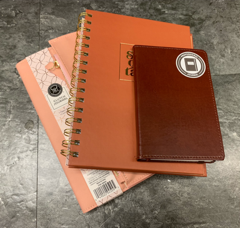
It could be a hardbacked calendar book.

The point: designate a concrete, physical binder to only be used for the sole purpose of tracking our friends’ and family’s doings:
The ordinary.
The necessary.
The mundane.
Trust me.
We will be held in high esteem for our caring, our consideration and our attention to detail.
And best of all…It will be our own little secret. I’ll certainly never tell.
Keep Preserving Your Bloom,
Iris Ruth Pastor
JOOPS stands for Journal of Other People’s Sh*t
Yeah. Yeah. Yeah. I know there are all kind of online apps to track special occasions – like close friends’ birthdays and anniversaries. I am way too attention deficit to track them down, sort them out, try them out and then master one.
Though I have not found one, there is probably an app for keeping track of the myriad number of endless events, happenings and activities of our close friends and family too – better known as those individuals who are in our first concentric circle of personal support and engagement.
Robin Dunbar, an Oxford evolutionary psychologist, is best known for his namesake “Dunbar’s number.” This is the number of stable relationships people are cognitively able to maintain at once. The proposed number is 150.
Actually, I think I have a lot more than 150. I am, and always have been, a people collector. I simply can’t help it. I love people. I love their stories. I love to figure out what makes them tick.
Now I‘m not sure they are all “stable” (tee hee) relationships. And I am also pretty sure I am not cognitively capable of keeping track of everyone’s events, milestones, doc appointments, health crises, celebratory moments, travel plans, sporting events, professional successes, etc.
Years ago, I would have effortlessly remembered the minutiae without a list, app or tracking device. Not anymore. From the mundane to the memorable, I simply can’t keep in my head all the relevant and important details of the people in my life that have a rank on my own personal Dunbar number.
A friend’s arrival back in Florida after summering in NJ
A friend’s son’s bone marrow transplant treatment
My adult kids’ professional presentations
My sons’ important calls with colleagues, travel schedule, golf and tennis game scores
My grandkids’ soccer games, tennis matches, and school projects
My favourite nail tech’s breast surgery
Friends’ husbands’ heart surgery, knee/hip replacement
operations, skin cancer treatments
My daughter-in-law’s new position
A reminder to each of my adult sons to get a colonoscopy and then keeping track of which ones actually did
When we recall seemingly effortlessly both the mundane and the memorable, it speaks that we care. That we honor both milestones and the minor occurrences that make up so much of our daily lives.
When we ask at the wrong time –
Miss the event entirely –
Never remember that we even forgot –
We come off as self-absorbed.
Unfeeling.
Not listening.
Dismissive.
We don’t come off as what we are: well-intentioned, absent-minded geezers. I’m tired of forgetting things I should have remembered or wanted to remember, but nevertheless have a hard time remembering.
Hence JOOPS – Journal of Other People’s Sh*t
It can be a plain spiral notebook filled with lined pages or a leather-bound journal.

It could be a hardbacked calendar book.

The point: designate a concrete, physical binder to only be used for the sole purpose of tracking our friends’ and family’s doings:
The ordinary.
The necessary.
The mundane.
Trust me.
We will be held in high esteem for our caring, our consideration and our attention to detail.
And best of all…It will be our own little secret. I’ll certainly never tell.
Keep Preserving Your Bloom,
Iris Ruth Pastor
Published on October 08, 2021 08:00
October 1, 2021
This Is A Hard Column To Write
This is a hard column to write because I don’t want to come off as a self-absorbed, spoiled princess bitch……
My late mother – of blessed memory – always reminded me that I went out of the way to make things difficult for myself. Regrettably, not only did I never listen to her – I never even paused for a nano-second to consider that what she was espousing had even a tiny kernel of truth.
At age 74, I am beginning to heartily reconsider my mother’s point.
When I found out my husband needed additional back surgery, I automatically slid into my advocacy role. His needs are my primary concern – which is as it should be, right?
When he’s released from the hospital a week after surgery, I realize that I will be on my own with him for at least ten days in a hotel room in Manhattan before returning home to Florida.
Usually, I would go into martyr mode:
No one can take care of him but me.
All pleasure-seeking activities must come to a standstill until life resumes its pre-surgery normalcy.
I can’t enjoy Manhattan’s treasures while he recuperates.
First, I let myself day dream – consciously admitting that there are some enjoyable things I’d like to be doing in the Big Apple while he is recuperating. I push aside the well of guilt surging over me from even thinking of such indulgences and diversions.
I’m in New York City. Bloomingdales is down the street. The Metropolitan of Art just blocks away. Nail salons dot every block. Our hotel connects to a spiffy day spa. Outdoor cafes and juice bars beckon amidst the beautiful, balmy September weather.
Do I dare shop?
Schedule a mani and pedi?

Read a novel as I sip a glass of red wine at an outdoor café?
Enjoy “A Lexicon of Fashion” at the Met – ensembles by a diverse range of designers, beginning in 1940 to present day?
I can readily justify getting a home health aide to come by and stay with my husband so I can shop for groceries, pick up his prescriptions, and buy him his blood pressure and oxygen machines.
Do I dare get a home health aide to come by and stay with my husband so I can have lunch with one of my sons who works in the City? So I can watch one of my grandsons play a Sunday morning basketball game in New Jersey? So I can just casually hang with my kids and their families each weekend? And hug my grandkids on an ongoing basis?

I book the home health care aid for additional hours.
It’s hard to admit to myself that in order to Keep Preserving My Bloom seeking out pleasurable activities – even in times of turmoil – are what does the trick.
My decision to spend precious time with my family plus indulging in pleasurable past times during my husband’s post-op recovery has made me a much happier, more caring and more present wife – catering to his needs with a smile on my face and a genuinely patient demeanor. And dismantling the martyr harness has also made me a less demanding mother during this stressful interlude – just ask my five sons.
I wish my mom were around so I could tell her she was right. Because she was.
Keep Preserving It, Baby – it works!
Iris Ruth Pastor
My late mother – of blessed memory – always reminded me that I went out of the way to make things difficult for myself. Regrettably, not only did I never listen to her – I never even paused for a nano-second to consider that what she was espousing had even a tiny kernel of truth.
At age 74, I am beginning to heartily reconsider my mother’s point.
When I found out my husband needed additional back surgery, I automatically slid into my advocacy role. His needs are my primary concern – which is as it should be, right?
When he’s released from the hospital a week after surgery, I realize that I will be on my own with him for at least ten days in a hotel room in Manhattan before returning home to Florida.
Usually, I would go into martyr mode:
No one can take care of him but me.
All pleasure-seeking activities must come to a standstill until life resumes its pre-surgery normalcy.
I can’t enjoy Manhattan’s treasures while he recuperates.
First, I let myself day dream – consciously admitting that there are some enjoyable things I’d like to be doing in the Big Apple while he is recuperating. I push aside the well of guilt surging over me from even thinking of such indulgences and diversions.
I’m in New York City. Bloomingdales is down the street. The Metropolitan of Art just blocks away. Nail salons dot every block. Our hotel connects to a spiffy day spa. Outdoor cafes and juice bars beckon amidst the beautiful, balmy September weather.
Do I dare shop?
Schedule a mani and pedi?


Read a novel as I sip a glass of red wine at an outdoor café?
Enjoy “A Lexicon of Fashion” at the Met – ensembles by a diverse range of designers, beginning in 1940 to present day?
I can readily justify getting a home health aide to come by and stay with my husband so I can shop for groceries, pick up his prescriptions, and buy him his blood pressure and oxygen machines.
Do I dare get a home health aide to come by and stay with my husband so I can have lunch with one of my sons who works in the City? So I can watch one of my grandsons play a Sunday morning basketball game in New Jersey? So I can just casually hang with my kids and their families each weekend? And hug my grandkids on an ongoing basis?

I book the home health care aid for additional hours.
It’s hard to admit to myself that in order to Keep Preserving My Bloom seeking out pleasurable activities – even in times of turmoil – are what does the trick.
My decision to spend precious time with my family plus indulging in pleasurable past times during my husband’s post-op recovery has made me a much happier, more caring and more present wife – catering to his needs with a smile on my face and a genuinely patient demeanor. And dismantling the martyr harness has also made me a less demanding mother during this stressful interlude – just ask my five sons.
I wish my mom were around so I could tell her she was right. Because she was.
Keep Preserving It, Baby – it works!
Iris Ruth Pastor
Published on October 01, 2021 08:00
September 24, 2021
Book Buying Spree
My stacks of “Books To Read” grows steadily larger and larger – near to toppling over from their precarious perch upon my old fashioned, no longer used scale.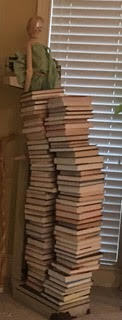
Here’s the interesting part: along with the growing number of books I have yet to read is the burgeoning stack I’ve started and then abruptly abandoned.
Too intricate
Too slow moving
Too long
Too small font
Not willing to actually bash an author – people I deeply admire in general – I will forgo specific titles to be avoided at all costs.
With my husband’s looming surgery, however, I was hell bent on tracking down super absorbing books to both calm me down and divert me.
Here’s two:
The Midnight Library by Matt Haig
The Plot by Jean Hanff Korelitz
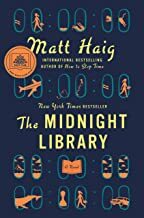
The Midnight Library deals with that provocative, emotion laden topic: REGRETS.
As in the road not taken
As in the talent not tapped into
As in the relationship left unexplored
As in the opportunity missed
Who among us doesn’t wonder where would we be if we had gone to a different college, moved to a different city, embarked on a different career path, or married our high school sweetheart?

The second attention grabbing novel is The Plot – a story of an “ordinary” writer who gets a glimpse of an extraordinary storyline from a former student and runs with it. It’s his fear of discovery that peoples the story – and the plagiarized tale he tells is added spice to the plot of The Plot.
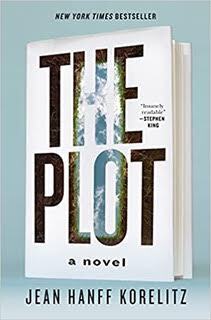
Along with the novel’s twists and turns is an added bonus: Korelitz utilizes lots of SAT words I haven’t used in years – words whose meanings I only dimly recall.
Vapidity – dullness, flatness
Cogent- a clear, logical and convincing case or argument
Opined – hold and stated as one’s opinion
Purloin – to steal
Sanguine – optimistic or positive especially in an apparently bad or difficult situation
AND my absolutely favorite, though not even a word when I took the SAT’s, and just added to the Merriam-Webster Dictionary in 2018: Mansplaining – when a man is compelled to explain or give an opinion about everything – especially to a woman. Often spoken in a condescending manner, even if he doesn’t know what he’s talking about or even if it’s none of his business. (OMG! I love this term!)
Happy reading.
Happy vocabulary building.
And Keep Preserving Your
Bloom,
Iris Ruth Pastor
PS While we are on the subject of reading, I’m in New York City. Every day on my walk to the hospital to visit my husband, I pass kiosks sporting faded signs indicating they sell newspapers. But I never see any.
Yesterday, I stopped mid-step, pivoted back to the kiosk I had just passed and asked a simple question: Can I buy today’s newspaper paper here?
“Nope, lady,” the young proprietor quipped in a bored voice. “We don’t sell newspapers here anymore.”
Imagine visiting New York City and not readily finding a Sunday New York Times to buy and read.
Yeah, yeah, I know I can get it on-line, but my senses rebel at the sterile thought of it.

Here’s the interesting part: along with the growing number of books I have yet to read is the burgeoning stack I’ve started and then abruptly abandoned.
Too intricate
Too slow moving
Too long
Too small font
Not willing to actually bash an author – people I deeply admire in general – I will forgo specific titles to be avoided at all costs.
With my husband’s looming surgery, however, I was hell bent on tracking down super absorbing books to both calm me down and divert me.
Here’s two:
The Midnight Library by Matt Haig
The Plot by Jean Hanff Korelitz

The Midnight Library deals with that provocative, emotion laden topic: REGRETS.
As in the road not taken
As in the talent not tapped into
As in the relationship left unexplored
As in the opportunity missed
Who among us doesn’t wonder where would we be if we had gone to a different college, moved to a different city, embarked on a different career path, or married our high school sweetheart?

The second attention grabbing novel is The Plot – a story of an “ordinary” writer who gets a glimpse of an extraordinary storyline from a former student and runs with it. It’s his fear of discovery that peoples the story – and the plagiarized tale he tells is added spice to the plot of The Plot.

Along with the novel’s twists and turns is an added bonus: Korelitz utilizes lots of SAT words I haven’t used in years – words whose meanings I only dimly recall.
Vapidity – dullness, flatness
Cogent- a clear, logical and convincing case or argument
Opined – hold and stated as one’s opinion
Purloin – to steal
Sanguine – optimistic or positive especially in an apparently bad or difficult situation
AND my absolutely favorite, though not even a word when I took the SAT’s, and just added to the Merriam-Webster Dictionary in 2018: Mansplaining – when a man is compelled to explain or give an opinion about everything – especially to a woman. Often spoken in a condescending manner, even if he doesn’t know what he’s talking about or even if it’s none of his business. (OMG! I love this term!)
Happy reading.
Happy vocabulary building.
And Keep Preserving Your
Bloom,
Iris Ruth Pastor
PS While we are on the subject of reading, I’m in New York City. Every day on my walk to the hospital to visit my husband, I pass kiosks sporting faded signs indicating they sell newspapers. But I never see any.
Yesterday, I stopped mid-step, pivoted back to the kiosk I had just passed and asked a simple question: Can I buy today’s newspaper paper here?
“Nope, lady,” the young proprietor quipped in a bored voice. “We don’t sell newspapers here anymore.”
Imagine visiting New York City and not readily finding a Sunday New York Times to buy and read.
Yeah, yeah, I know I can get it on-line, but my senses rebel at the sterile thought of it.
Published on September 24, 2021 08:00



